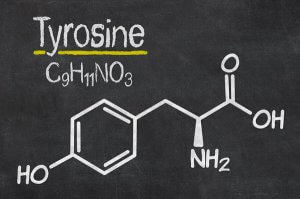Table of Contents
Key Takeaways
- Tyrosine boosts working memory, executive function, and creativity.
- It aids in stress reduction, mood improvement, and anxiety alleviation.
- Tyrosine lessens symptoms of ADHD.
- L-Tyrosine is a crucial precursor for catecholamine neurotransmitters.
- In a hurry – click here to learn more about getting an effective dose of L-Tyrosine in: Mind Lab Pro®
L-Tyrosine is the master precursor required to form all catecholamine neurotransmitters.
Your brain uses the enzyme tyrosine hydroxylase to convert L-Tyrosine into L-DOPA. Decarboxylation of L-DOPA results in synthesis of the neurotransmitter dopamine.[i]
Once converted into dopamine, the enzyme dopamine-beta-hydroxylase converts L-DOPA into norepinephrine (noradrenaline).
And Phenylethanolamine n-methyltransferase converts norepinephrine into epinephrine (adrenaline).
This triad of neurotransmitters are collectively known as “catecholamines”.
Tyrosine can be a highly effective nootropic for boosting cognitive function. And is particularly helpful in maintaining cognitive performance when you’re under practically any kind of stress. Including music played above 90 dB’s.
L-Tyrosine works in synergy with stimulants like methylphenidate (i.e. Ritalin).[ii] Drugs like Ritalin work by blocking the reuptake of the neurotransmitters dopamine, and norepinephrine. And if there’s not enough dopamine available to do the job, Ritalin doesn’t work very well. L-Tyrosine potentiates increases in extracellular dopamine.
L-Tyrosine also stimulates the production of thyroid hormones T3 (triiodothyronine) and T4 (thyroxine) which are crucial in maintaining both overall physical and cognitive health.
L-Tyrosine can boost libido, memory, focus, concentration, mood, offers anti-depressant effects, and improves executive function in those with ADHD.
Tyrosine helps:
- Cognitive Stress. L-Tyrosine produces the catecholamine-triad of neurotransmitters dopamine, norepinephrine, and epinephrine. Sleep deprivation and extreme stressors like heat and cold can deplete catecholamine levels. L-Tyrosine restores them to preserve optimal cognition.[iii]
- Neurotransmitters. L-Tyrosine is a required precursor for dopamine, norepinephrine, and epinephrine. As your dopamine levels increase, you’re better able to concentrate, organize your thoughts, and stay productive.
- Attention Deficit Disorder (ADHD). L-Tyrosine can be an effective treatment for ADHD symptoms. It works in synergy with pharmaceutical drugs like Ritalin and Adderall by boosting extracellular levels of dopamine. Helping these drugs be more effective. And mitigating side effects like crashes when the drug wears off.
Overview
Your brain converts L-Tyrosine to L-DOPA which then produces the neurotransmitter dopamine. The unused dopamine is then further converted into the neurotransmitters norepinephrine (noradrenaline) and epinephrine (adrenaline). This triad of neurotransmitters are collectively referred to as “catecholamines”.
 “Tyrosine” is derived from the Greek word tyros, meaning cheese. It was first discovered by German chemist Justus von Liebig in 1846 in the protein casein from cheese.
“Tyrosine” is derived from the Greek word tyros, meaning cheese. It was first discovered by German chemist Justus von Liebig in 1846 in the protein casein from cheese.
Tyrosine is considered a non-essential amino acid because it can be synthesized in your body from phenylalanine. Which is found in many high-protein foods such as poultry, fish, dairy, nuts, soy products, lima beans, avocados and bananas.
L-Tyrosine amino acid supplementation enhances working memory and executive function in the prefrontal cortex. It helps with creative flow states, is fuel for inspiration, cognitive flexibility, and the kind of “convergent thinking” you do in multiple choice exams.
L-Tyrosine assists in the production of thyroid hormones T3 (triiodothyronine) and T4 (thyroxine) which are crucial in maintaining both overall physical and cognitive health.
L-Tyrosine vs N-Acetyl L-Tyrosine (NALT): What’s the Difference?
N-Acetyl L-Tyrosine (NALT) is the amino acid L-Tyrosine with an acetyl group added. When you take NALT as a supplement, it breaks down in your kidneys back into L-Tyrosine. So in theory, the two supplements offer the same benefits.
There is some debate in the nootropics community on which is more effective. NALT or plain L-Tyrosine. NALT is a more soluble form of L-Tyrosine so it should be more bioavailable to your body.
However, some studies report that in some cases, a sizeable percentage of supplemental NALT is excreted in urine before it’s converted into L-Tyrosine.[iv]
On a personal note, I haven’t had any issues using NALT as a source of L-Tyrosine. It gives me a dopamine and adrenal boost you’d expect from supplementing with a dopamine precursor.
But when I haven’t any NALT around I successfully switch to L-Tyrosine although at a slightly higher dose.
When dealing with ADHD/ADD, L-Tyrosine is particularly effective when stacked with ALCAR (Acetyl-L-Carnitine). ALCAR easily crosses the blood-brain barrier for boosting acetylcholine levels. And seems to positively influence serotonin levels. And Tyrosine provides my brain with the dopamine it needs to mitigate symptoms of ADHD/ADD.
I find that L-Tyrosine stacked with 20 mg of Ritalin twice a day works particularly well. Clearly, this brain doesn’t have the capacity to produce enough dopamine on its own. And needs the boost that comes from supplementing with Tyrosine.
So like all nootropics, YMMV. Always take into account how each nootropic works synergistically with others in your stack. And how they work with any meds you need to take.
This is as much art as it is science. And experimentation is key for optimal cognition.
How does L-Tyrosine work in the Brain?
L-Tyrosine boosts brain health and function in several ways. But two in particular stand out.
- L-Tyrosine improves memory and cognition under acute stress. Acute stress is defined as short-term stressors that can affect cognition. Examples are extreme heat or cold. Things like cold showers, extreme sports, car accidents, relationship problems, intense movies, business deals gone awry, exams and war zones.
In one study done at the University of Bedfordshire in the UK, the effect of L-Tyrosine on cognitive performance was measured before an exercise task.
Researchers recruited 8 soccer players. And had them complete a 90-minute soccer simulation performance test in an environmental chamber set at 77 degrees Fahrenheit.
The soccer players were given either L-Tyrosine before exercise or a placebo. Cognitive performance was measured before the exercise task. Then again at “half-time”, following half time, and following the entire simulation.
The cognitive performance task assessed dual-task and vigilance. The outcome revealed that cognitive vigilance and reaction time among soccer players significantly improved following administration of L-Tyrosine.
Results showed that in warm-weather conditions, L-Tyrosine could enhance cognitive function and prevent cognitive impairment during exposure to exercise-heat stress.[v]
- L-Tyrosine boosts neurotransmitters. L-Tyrosine taken as a supplement converts into the neurotransmitter dopamine. Dopamine helps control movement in your body, is fundamental to memory, attention and problem solving.
The unused dopamine can then convert into the neurotransmitters norepinephrine (noradrenaline) and epinephrine (adrenaline).
Norepinephrine is important for attentiveness, emotions, sleeping, dreaming and learning.
Epinephrine drives your ‘flight-or-flight’ response. It’s what prompts your reaction to dangerous circumstances, emergency situations, or in stressful situations or environments.
In one study done in the Netherlands, researchers determined if L-Tyrosine would boost cognitive resources associated with cognitive control. They performed tests designed to measure “working memory” using the N-Back Test.
Study participants were assigned to engage in a “1-back” condition of easy difficulty and then a 2-back condition of tougher difficulty. Those that used L-Tyrosine demonstrated superior performance in the 2-back test, but not the 1-back test.
The study authors suggested that L-Tyrosine provides greater cognitive enhancement when cognitive demand increases. The bottom-line; supplementation of L-Tyrosine may help you increase your IQ score due to maximizing catecholamine reserves.[vi]
How things go bad
As we get older, our brain and body chemistry and energy metabolism changes.
 ↓ Dopaminergic neurons are damaged or die
↓ Dopaminergic neurons are damaged or die
↓ Neurotransmitter levels decline
↓ Thyroid hormones decline
↑ Stress levels increase
↓ Working memory and mood decline
All of these changes are often attributed to aging. But could be a result of dietary and lifestyle choices.
Unchecked, they could lead to neurodegenerative diseases like Parkinson’s, a drop-in quality of life and depression.
L-Tyrosine benefits
L-Tyrosine can boost levels of the neurotransmitters dopamine, norepinephrine, and epinephrine. And contributes to the production of thyroid hormones T4 and T3.
Tyrosine can help boost cognition especially in stressful situations. It helps improve decision making, ‘flow state’ and creativity, cognitive flexibility, and working memory.
L-Tyrosine converts into L-DOPA to produce dopamine. L-DOPA is also used to make melanin in your body. This conversion process helps in the removal of neurotoxic quinones. And chelates heavy metals like mercury and lead which can accumulate in and damage neurons.
The dopamine that is not used by your brain is available to produce norepinephrine (noradrenaline) which is important for attentiveness, emotions, sleeping, dreaming, and learning.
L-Tyrosine can be an effective nootropic when stacked with ADHD/ADD meds like Ritalin or Adderall. It helps supply extracellular dopamine needed to improve the effectiveness of stimulants used to boost the uptake of dopamine in your brain.
How does L-Tyrosine as a nootropic feel?
Keep in mind that L-Tyrosine is a precursor to catecholamines. So if you’re not ‘low’ on dopamine, norepinephrine or epinephrine – you may not ‘feel’ anything.
 Many neurohackers report a lift in mood, better focus, concentration, increased energy, and an overall sense of well-being. L-Tyrosine can help readjust your motivation levels. It can help lower anxiety levels, especially social anxiety.
Many neurohackers report a lift in mood, better focus, concentration, increased energy, and an overall sense of well-being. L-Tyrosine can help readjust your motivation levels. It can help lower anxiety levels, especially social anxiety.
Supplementing with L-Tyrosine can help bring your blood pressure down if its elevated from a stressful situation or environment. Take it before the stressful event if you can.
L-Tyrosine helps buffer the effects of stimulants like caffeine or amphetamines. It helps potentiate and prolong the effects of Ritalin or Adderall, and reduces the crash.
If you’re into athletics or do manual work, you’ll find that supplementing with L-Tyrosine before a workout or construction job will leave you feeling great afterwards. It helps mitigate many of the effects of acute stress caused by short-term stressors.
And L-Tyrosine helps your body to produce melanin, so you may find it easier to get a tan while at the beach.
L-Tyrosine Research
L-Tyrosine to treat ADHD
Several studies have investigated using L-Tyrosine for the treatment of attention deficit hyperactivity disorder (ADHD). One informal study published in the 1980’s determined that L-Tyrosine resulted in short-term relief from ADHD symptoms. But subjects eventually reached tolerance and a diminished effect.
This is important for neurohackers to keep in mind. It seems that L-Tyrosine on its own can benefit some more than others. Regardless if you’re treating ADHD, or are perfectly cognitively healthy.
I’ve seen more than one report of nootropic users experiencing tolerance after just a week of supplementing with L-Tyrosine. But most peer-reviewed, published studies show positive results.
One study published in Neuropsychiatric Disease and Treatment in 2011 looked at using amino acid precursors for the treatment of deficit hyperactivity disorder (ADHD). Including L-Tyrosine for dopamine, and 5-HTP for serotonin.
The study used 85 young people aged 4 – 18 years old, all with a clinical diagnosis of ADHD. They were treated for an initial period of 8 – 10 weeks.
Urinary samples to determine serotonin and dopamine levels were collected within the first 4 weeks. If they didn’t reach adequate levels, subjects were moved to higher dosing levels 2 and then 3 until they got relief from symptoms.
Researchers found that the dopamine and serotonin precursors yielded similar results to Strattera and Ritalin. And “the amino acid protocol may be equal in efficacy to potent, pharmaceutical ADHD medications”.[vii]
L-Tyrosine reduces blood pressure under stress
This study is particularly interesting for its nootropic application. It’s commonly understood that blood pressure rises when we’re under stress. The source of stress doesn’t really matter. Stress up = blood pressure up.
A study in Amsterdam showed that L-Tyrosine administration decreased blood pressure about 15 minutes after ingestion. This study involved assessing task performance following acute stress.
Acute stress is usually short-term and can be caused by driving, fighting, athletics, martial arts training, war, combat training, CrossFit, cold showers, loud music, intense movies, loud noises, business deals, relationships, school, exams and more.
The point is, this study is applicable to every one of us. The study found that L-Tyrosine reduced diastolic blood pressure within 15 minutes of taking the supplement. And blood pressure normalized within 1 hour.
This study tells us that L-Tyrosine may promote a decrease in blood pressure caused by stress. And could be used to mitigate the effects of stressful situations if taken prior to the stressful event.[viii]
L-Tyrosine promotes cognitive flexibility
Cognitive flexibility applies to those who can adjust their thinking quickly to adapt to novel situations and stimuli. A high degree of cognitive flexibility is associated with increased fluid intelligence, superior reading and comprehension, and a healthier brain.
Recent research (2015) supports the idea that L-Tyrosine promotes cognitive flexibility. In this trial, researchers recruited 22 adults. And setup a double-blind, placebo-controlled study.
All subjects were assigned a task switching procedure to measure their flexibility. The results showed that receiving L-Tyrosine supplementation increased cognitive flexibility compared to the placebo group.
The researchers determined that “L-Tyrosine can facilitate cognitive flexibility by repleting cognitive resources”.[ix]
The team observed that increased cognitive flexibility was likely due to a boost in dopamine concentrations. They noted that L-Tyrosine enhanced usage of various cognitive resources. And one way to increase your cognitive flexibility would be to start supplementing with L-Tyrosine.
It stands to reason that people who are close-minded, set it their ways, are resistant to change and can’t cope with unexpected stimuli or situations have “cognitive rigidity”. And it’s likely due to suboptimal dopamine levels.
L-Tyrosine Dosage
L-Tyrosine suggested dosage for cognitive benefit is 500 mg – 2 grams per day.
You may find your body responds to smaller doses. Or even more if you’re stacking it with stimulants like ADHD meds. Listen to your body and see how you react.
If you find you do not experience the full benefit from L-Tyrosine, then try using it an hour before or two hours after a meal. Because L-Tyrosine taken as a supplement may compete with other amino acids in food for transport into your system.
I personally stack L-Tyrosine with my Ritalin dose twice per day. And a final dose of L-Tyrosine late afternoon to prevent a stimulant crash.
NOTE: long-term use of L-Tyrosine can suppress serotonin. Symptoms include depression, fatigue or severe anxiety feeling much like a panic attack. You can easily counter this by supporting serotonin with a 250 – 500 mg L-Tryptophan about 60 mins. before bed.
L-Tyrosine Side Effects
L-Tyrosine is considered non-toxic and very safe. Most neurohackers and healthy human adults don’t have any negative side effects from using amino acid tyrosine as a nootropic supplement.
At higher doses there are reports of stomach issues and migraines. Migraine problems usually happen to those who already suffer from migraines. This may be an indication that your neurotransmitter levels are already optimal, and you don’t need to supplement with L-Tyrosine.
L-Tyrosine can increase your thyroid hormones. So if you’re hyperthyroid you should use caution when supplementing with L-Tyrosine because it may change the way your thyroid meds work.
And if you’re taking MAO inhibitors (MAOI’s) like selegiline, Azilect, Marplan or Nardil you should not use L-Tyrosine.
Monoamine oxidase inhibitors (MAOIs) work in your brain by blocking the enzyme monoamine oxidase. This enzyme normally blocks excess dopamine. But when you block the enzyme, more dopamine is released.
So using L-Tyrosine in combination with MAOI’s could raise dopamine levels too high. Resulting in a rapid rise in blood pressure (hypertensive crisis). Causing severe headache, nausea and sweating, severe anxiety, rapid heartbeat, chest pain, vision changes, shortness of breath and confusion.
A severe increase in blood pressure from this combo can lead to hemorrhagic stroke or a heart attack.
Where to buy L-Tyrosine
L-Tyrosine is available to buy in powder, capsule and tablet form. Capsules and tablets are usually 300 – 500 mg.
Some pre-made nootropic stacks and workout stacks also include L-Tyrosine as part of their formula.
N-Acetyl L-Tyrosine (NALT) is an alternative to plain L-Tyrosine. NALT has an acetyl group added to L-Tyrosine in an attempt to make it more bioavailable.
For example, Mind Lab Pro® contains 11 brain enhancing nootropic compounds including N-Acetyl L-Tyrosine.
I recommend Mind Lab Pro because it addresses all aspects of anxiety resistance, memory and cognitive enhancement, stabilizes mood, brain repair, and maintenance.
This premium nootropic stack is designed to affect neurotransmitters, cognitive energy, brain waves, neuroprotection, and regeneration. See my Mind Lab Pro review for a detailed report.
Ensure you read labels carefully and stick with manufacturers who follow Good Manufacturing Practices (GMP). And are GMP-Certified. And do your best to avoid toxic “other ingredients” which are usually listed at the bottom of “Supplement Facts” labels.
Nootropics Expert Recommendation
 L-Tyrosine 500 mg – 2 grams per day
L-Tyrosine 500 mg – 2 grams per day
I recommend using L-Tyrosine as a nootropic supplement.
Your body does synthesize some L-Tyrosine from phenylalanine which comes from high-protein foods like chicken, fish, almonds, avocados and bananas.
But most of us don’t get enough L-Tyrosine from our diet. So supplementation will help.
L-Tyrosine is helpful for most neurohackers to combat stress and sleep deprivation. It’ll boost dopamine, norepinephrine and epinephrine levels.
It’s particularly helpful if you take L-Tyrosine prior to a stressful situation, workout or physically demanding job.
L-Tyrosine is especially helpful to those dealing with ADHD/ADD. It’s a great compliment to stack with stimulant meds like Ritalin or Adderall. L-Tyrosine will provide the dopamine your brain needs. It will help smooth out and prolong the effects of stimulant meds. And help prevent the associated crash when they wear off.
A good stack for ADHD is using your usual med dose with L-Tyrosine 500 mg, Alpha GPC 300 mg, and ALCAR 500 mg. Which is should particularly effective if you are dealing with any phenylalanine abnormalities.
You can buy individual L-Tyrosine supplements. Or you could try my favorite pre-formulated nootropic stack Mind Lab Pro® which includes N-Acetyl L-Tyrosine (NALT).
Mind Lab Pro contains a synergistic blend of 11 brain enhancing nootropics covering all aspects of cognition and brain health. See my full Mind Lab Pro review for more.
You can safely use up to 2,000 mg per day when stacking with ADHD meds. But in smaller divided doses throughout your day.









Join The Discussion - 417 comments
Kiley
October 14, 2022
Hi David,
I currently take 40mg of Vyvanse in the morning on an empty stomach for ADHD.
I was looking at the ADHD stack you have listed, and wanted to include l-tyrosine to lessen the Vyvanse crash.
I also take Trazodone an hour before bed for insomnia.
Trazodone increases the levels of serotonin between nerve cells. With that said, will I need to supplement the tryptophan at night?
Should I take l-tyrosine an hour before or after Vyvanse?
Thanks so much for all your information on this website!
David Tomen
October 22, 2022
Kiley, I take L-Tyrosine each time I use Ritalin. And it works great. But only you can know if you’ll need to supplement with L-Tryptophan before bed to keep dopamine and serotonin in balance. Trazadone effects serotonin and the way it is used, but it does not increase it.
Yentl
October 6, 2022
Hi David,
Could it be possible to get severe Social Anxiety and Migraines also from L-tryptophan caused Serotonine imbalance?
Instead of having a Dopamine imbalance caused by L-Tyrosine?
I suspect Gaba, and some of the other chemicals such as glutamate and the other brain related things you talk about have role to play in this as well…
I used to have severe insomnia. Now, I sleep well, no insomnia whatsoever but I have social anxiety. Not sure what’s changed!
I’m very tense, nervous and get extreme migraines around a lot of people. You have any idea what may cause this and how I best resolve it?
David Tomen
October 6, 2022
Yentl, each of these neurotransmitters must be in balance. Excess serotonin will depress dopamine. And vice versa.
This could be a cause for social anxiety. But according to more recent research shows migraines may be due to calcitonin gene-related peptide (CGRP) that induces pain response and decreased levels of serotonin: https://www.ncbi.nlm.nih.gov/pmc/articles/PMC4117050/
Cindy
September 23, 2022
Hi, I have been taking L Tryptophan, GABA, for anxiety, racing thoughts, slight depression with good success. But I felt I needed more dopamine (Parkinson’s disease runs in my family) so recently added L Tyrosine. Since adding the L Tyrosine I have terrible insomnia. I take the L Tyrosine in the morning about 6:00 and I feel great during the day. Does this mean my body does not need more dopamine and I should continue to increase my serotonin and maybe try again later to take the L Tyrosine?
David Tomen
September 24, 2022
Cindy, you may not need additional dopamine at this time. But you can do things to keep your dopamine system in good shape by using supplements like NAC, and anything else that boosts BDNF: https://nootropicsexpert.com/13-nootropics-to-boost-bdnf/
James
September 3, 2022
Hey David,
Given the relatively short half-life of Tyrosine, and the recommendation to fast an hour or two before and after taking it, I’m curious how you personally manage taking Tyrosine multiple times a day?
* Do you plan your meals out so that you’re able to have that “window” to have Tyrosine?
* Do you increase your dosage if you’ve had a shorter fast prior to taking it? Or for that matter, do you take higher/lower doses at different parts of the day?
* If you don’t fast before/after taking it, do you avoid protein foods and stick to purely carbs/fats foods?
* Or have you personally found that eating or not eating hasn’t affected how Tyrosine works for you?
Thanks 🙂
David Tomen
September 5, 2022
James, my life is complicated enough to worry about “with” or “on an empty stomach” when it comes to using amino acids. L-Tyrosine may compete with the same transporters as the amino acids found in whatever I eat. But the dose of L-Tyrosine is high enough that I get the benefit of the supplement each time I use it. It works and I’ve been doing it 3-times per day every day for the last 15 years.
James
August 27, 2022
Hey David,
Was just curious about the part where you say that long-term use of L-Tyrosine can suppress serotonin and that you could use L-Tryptophan before bed to counter this.
– Does long-term use mean as in everyday use? Would using Tyrosine say a few times a week over the long-term also lead to possible suppression of serotonin?
– How long is long term? Regular ongoing usage for months? Years?
– Does dose frequency and/or dose sizes matter for Tyrosine’s long term impact on serotonin? E.g. say someone having a lower dose once a day vs a larger dose multiple times a day?
– Would someone using ADHD stimulants be at a higher risk of having serotonin levels suppressed by also using Tyrosine long term?
David Tomen
August 31, 2022
James, L-Tyrosine has a half-life of about 3 hours. So the Tyrosine you take at 8 AM is gone by noon and can no longer produce dopamine. You must use it every day and twice per day if you want the benefit of more dopamine.
But increasing dopamine alone will suppress serotonin. And using Tryptophan alone will suppress dopamine. It makes no difference what you are using.
Drew R
August 22, 2022
David, learning much from these great articles, thanks!
I am getting started with managing my depression w/o SSRIs, which I used for many years.
I am working on a starter stack: L-Tyrosine 800mg,
L-Phenylalanine 300mg, B6, vitamin C. DMAE 45mg.
I am searching for a good serotonin booster to complete the stack. Any recommendations? Notes on what I have so far? Thanks!
David Tomen
August 23, 2022
Drew, if you are using L-Tyrosine you do not need to use L-Phenylalanine. The recommended adult dosage for L-Tyrosine is 500 mg twice per day. If you use 800 mg once per day you’ll be missing dopamine half of your day.
If you are using DMAE you should be using Alpha GPC or CDP-Choline along with ALCAR. And use a BioActive B-Complex instead of isolated B6. Otherwise, you’ll increase homocysteine levels and do it long enough give yourself a heart attack.
The only safe way to increase serotonin is by using 500 mg L-Tryptophan before bed.
Emile
August 17, 2022
Good evening David,
Firstly, I would like to thank you for sharing such an incredible wealth of information.
You have inspired me to do some extra research and following a youtube video of Dr Huberman and your suggestion on the above article I’ll be ordering L-Tyrosine, Choline Bitartrate, and ALCAR (without using any other nootropics) to try to help with my concentration issues which are very similar to ADHD.
My plan is to start with one product at low dosage work my way up, then add another one increase the dosage again, to finally add the last one and follow the same process while keeping well below your recommended measurements.
My question is; taking those products once in the morning do you think that the effect will last all day? Also, I’ll be using Creatine as part of my workouts, high strength Omega 3 and B vitamins complex. In addition to this, within a couple of weeks I’ll be introducing Tryptophan before bed. This stack is the result of long research. Do you think that I have the correct approach and could you please enlighten me with further suggestions or best practices?
Many thanks
Emile
Emile
August 17, 2022
To clarify, I have not been prescribed any meds (such as Ritalin or Modafinil) and while solely rely on the products I have listed on my comment.
David Tomen
August 21, 2022
Emile, forget about Choline Bitartrate because it does not easily cross your blood-brain barrier. A far better option is CDP-Choline along with ALCAR to increase acetylcholine.
You use all three twice per day because they have a short half-life. If you take them only in the morning they are gone by noon. And you will not get the benefit of enough dopamine and acetylcholine for the rest of your day.
JABA
July 23, 2022
Hello David,
First, thanks a lot for such a helpful article about L-Tyrosine.
I take 1000-1500 mg of L-Tyrosine 2-3 times per day to increase dopamine. At night after reading your suggestions, I started to take 500 mg of L-Tryptophan.
So my question is: Is it a good ratio to have in Balance Dopamine and Serotonin? Or when I increase Tyrosine, should I also increase Tryptophan?
Both products are 500 mg, and both product label says to take from 1 to 4 capsules per day, which means the maximum dose for Tyrosine as well as for Tryptophan is 2000 mg, according to the manufacturer.
I want to clarify with you this ratio/dosage confusion, and I am looking forward to hearing your advice about it.
I will appreciate any help you can provide.
David Tomen
July 23, 2022
Jaba, there is no established “ratio” because it depends on your system. But you are using very high doses of L-Tyrosine. Which will soon depress serotonin. So you may need more than 500 mg of L-Tryptophan. You will need to experiment and find the right amount for you.
JABA
July 24, 2022
Hello David. Thanks a lot for your quick reply.
So If I take L-Tyrosine 500 mg twice per day, can I also take 500 mg of Tryptophan twice a day, or it’s better to take L-Tryptophan only at night before bed?
I am not sure if it’s a good idea to take Tryptophan during the day, especially when you take L-Tyrosine in the morning and the afternoon.
Thanks a lot again for your help, and your advice will be highly appreciated.
David Tomen
July 24, 2022
Use L-Tryptophan about 60 minutes before bed. Because serotonin helps with the synthesis of melatonin.
JABA
July 24, 2022
Dear David, I am sorry I think I misexplained dosages in my above post.
I use 500 mg capsules of L-Tyrosine 2-3 times per day. So in total 1000-1500 mg per day.
So is it still considered too high 1500 mg per day?
And 500 mg of L-Triptophane will be enough to balance serotonin/dopamine balance, or do I still need to increase my Triptophane dosage at night?
Sorry for the confusion, and thanks for your help in advance.
David Tomen
July 24, 2022
Whew! Yes, the standard adult dosage for L-Tyrosine is 500 mg twice or three time per day. 500 of L-Tryptophan should be enough to keep dopamine and serotonin in balance.
JABA
July 26, 2022
Thanks a lot David for your quick reply.
I have one last question.
Can I take a coffee while I take L-Tyrosine, or it’s better to limit it or not take it at all? My concern is increased anxiety as I don’t want to provoke it
David Tomen
July 26, 2022
Coffee is a great nootropic as long as you support its use. Which means you also need to use L-Theanine and a B-Complex.
JABA
July 26, 2022
So if I understood well, L-Tyrosine doesn’t interact with coffee right?
David Tomen
July 27, 2022
The caffeine in coffee forces your brain to use more dopamine. So it helps to supplement with L-Tyrosine to restore the dopamine used by caffeine.
Ron
August 12, 2022
Hello David,
Do you think Quillichew, NAC, and L-tyrosine is a good stack for adhd? If so, can they all be taken at the same time?
David Tomen
August 14, 2022
Ron, yes you can take them at the same time. And it is a start but there are other supplements you can use as well for ADHD especially since you are using Quillichew (methylphenidate). See my ADHD article for those: https://nootropicsexpert.com/best-nootropics-for-adhd-add/
Yentl
August 29, 2022
David,
will L-Tryptophan, the precursor to Serotonine also imbalance Dopamine levels if we do not take L-Tyrosine?
Similar to L-Tyrosine potentially depleting Serotonine levels?
Kind regards,
Yentl
David Tomen
August 31, 2022
Yentl, it works both ways. But it depends on how much of each you use and for how long.